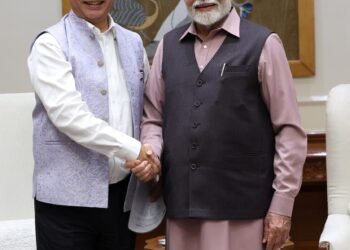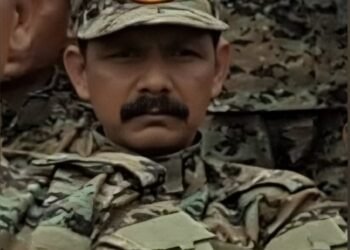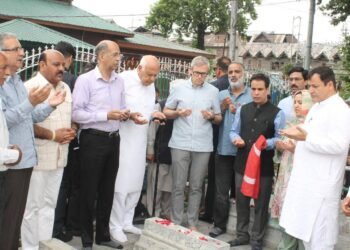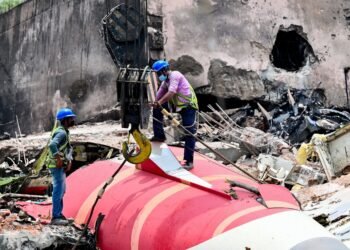In an unexpected gesture, Myanmar’s military has freed over 900 Rohingya prisoners, including women and children. The release coincides with the issuance of international arrest warrants by Argentina for Myanmar’s military leaders, accused of committing genocide in 2017. Human rights groups warn the move may be an attempt to cover up the regime’s atrocities.
BY Navin Upadhyay
Myanmar’s military government has released nearly 1,000 members of the Rohingya minority from prison, a move described by human rights groups as a rare gesture towards the persecuted community. According to the Political Prisoners Network Myanmar, 936 individuals were freed on Sunday from Insein Prison in Yangon, including 267 women and 67 children. These detainees were mostly arrested after the military coup in 2021, which ousted the elected government, and many had been imprisoned for violating restrictions on their movements, reports Radio Free Asia.
The junta has not officially announced the reasons for the release, nor have they provided any explanation for why it occurred at this particular time. However, the release came just days after a court in Argentina issued international arrest warrants for Myanmar’s junta chief, Senior Gen. Min Aung Hlaing, and 22 other military officials. The charges are related to the military’s brutal crackdown on the Rohingya community in 2017, which resulted in mass killings, gang rapes, and forced displacement. The U.N. later declared that the violence amounted to genocide and crimes against humanity.
ALSO READ: Myanmar, China Join Forces to End Cyber Crime Epidemic
The Argentine court ruling marked a significant legal step, as Argentina became the first country to open an investigation into these crimes under the principle of universal jurisdiction, which allows for the prosecution of severe crimes no matter where they were committed. While the Myanmar junta has continued to maintain that their actions in 2017 were part of legitimate security operations in response to Rohingya militant attacks, international pressure has been mounting, especially after the U.S. declared that the violence against the Rohingya was indeed genocide.
The Political Prisoners Network Myanmar (PPNM) stated that the military took 910 Rohingya, who were scheduled to be released from Yangon’s Insein Prison, out of their prison cells and away in vehicles on Saturday. #WhatsHappeninglnMyanmar #PPNM
Read more: https://t.co/omWvw2TDPN pic.twitter.com/9pEMKP9Vr9— DVB English News (@DVB_English) February 17, 2025
Thike Htun Oo, a senior member of the Political Prisoners Network Myanmar, stated that the junta’s decision to release the Rohingya appeared to be an effort to divert attention from the growing international scrutiny. “It is clear that the junta wants to cover up the crimes they’ve committed against the Rohingya,” he said. He also added that the release seemed to coincide directly with the issuance of the arrest warrants, suggesting that it was a move to mitigate the mounting pressure from international bodies.
ALSO READ: Climate Crisis Hits Kashmir: No Snow for Winter Games, Forests in Flames
The individuals who were freed were expected to be transported from Yangon to the capital of Rakhine state, Sittwe, a region where the majority of the Rohingya population in Myanmar resides. It is believed that most of the detainees were imprisoned for violating movement restrictions, as most Rohingya are stateless and are subject to severe limitations on their movement and rights under Myanmar’s laws.
The Myanmar military has not disclosed any further details about the nature of the detainees’ imprisonment, nor the specific conditions under which they were being held. However, it has been reported that officials from the military’s Immigration Department entered Insein Prison in Yangon on Saturday to issue the freed Rohingya with identity documents. It is unclear exactly what type of documents were provided, though this move could be seen as an attempt to formalize their status.
Rohingya activists, however, have raised concerns about the real intent behind the release. While it is being framed by some as a gesture of goodwill, it also comes at a time when there are increasing fears that the junta is attempting to bolster its image in the international community, particularly after the legal developments in Argentina. “They are trying to restore justice from their side, but they are not going to succeed in covering up their criminal actions,” said political analyst Than Soe Naing.
There are also growing fears among the Rohingya population that those released could be forcibly recruited to fight for the Myanmar military in Rakhine state, where the Arakan Army (AA), an ethnic insurgent group, has been gaining ground. The AA has been in conflict with the military, and some Rohingya who have been placed in refugee camps in Sittwe have already been coerced into joining the junta’s forces. Rohingya leaders, such as Nay San Lwin, co-founder of the Free Rohingya Coalition, expressed concern that those recently released may also face similar pressure.
Last year, reports indicated that the military had been recruiting Rohingya men from camps for displaced people in Sittwe to fight against the Arakan Army. This recruitment has led to attacks by the AA, during which Rohingya civilians were reportedly killed, though the AA denied the allegations. The military’s involvement with the Rohingya in such conflicts adds another layer of complexity to their already tenuous situation.
The broader context of this release also highlights the ongoing humanitarian crisis in Myanmar. The Rohingya remain one of the most marginalized and persecuted ethnic minorities in the country, and despite their release, many face an uncertain future, with the looming threat of forced recruitment, displacement, and continued discrimination. The international community continues to call for justice for the Rohingya, with many urging accountability for the military’s actions during the 2017 crackdown, but the path to justice remains unclear as Myanmar’s military government remains in power and continues to maintain a tight grip on the country.













